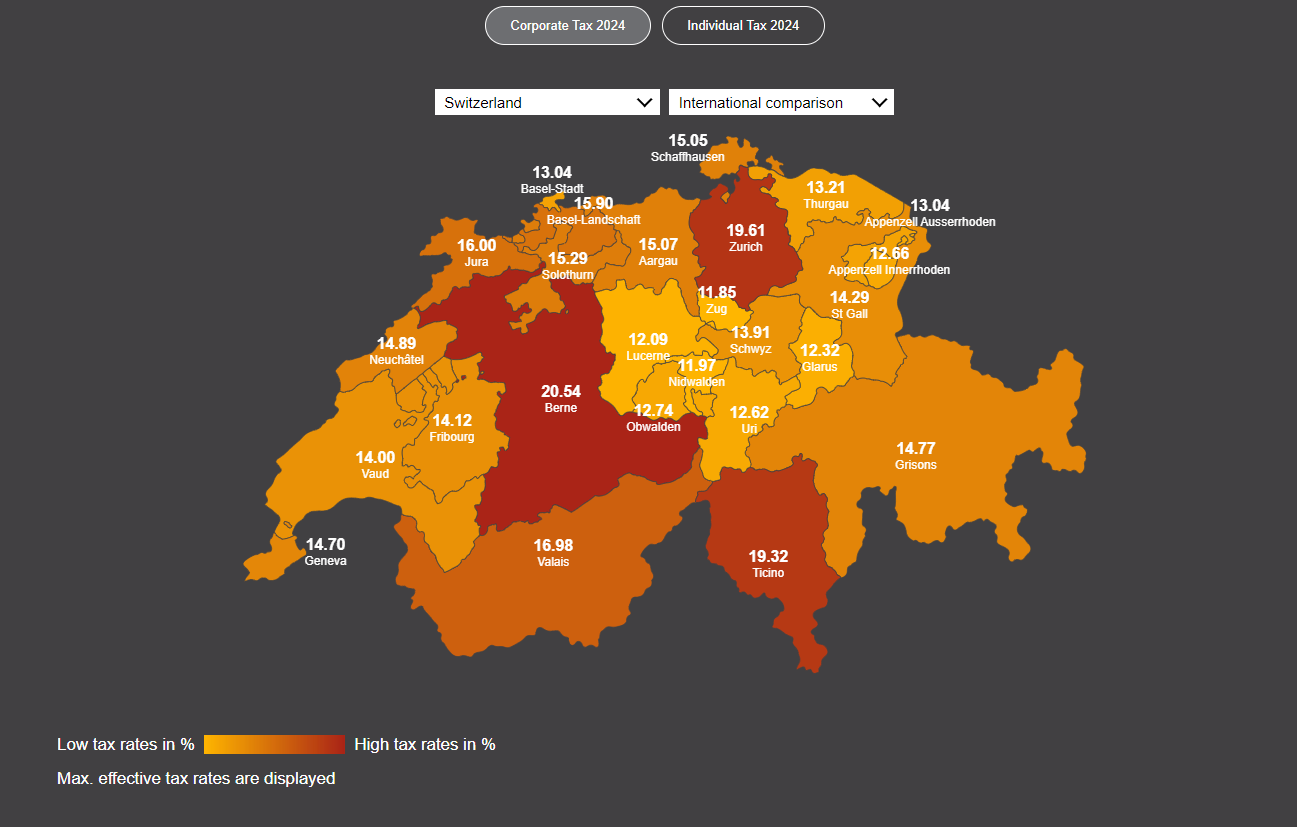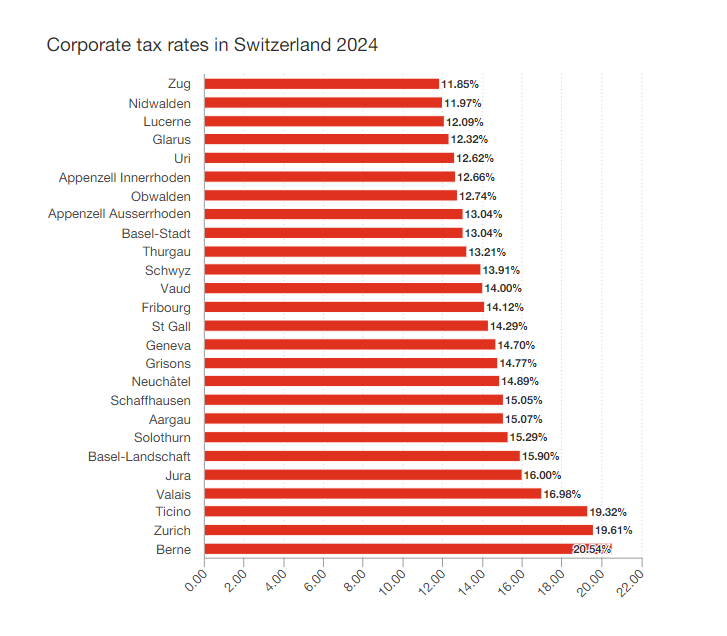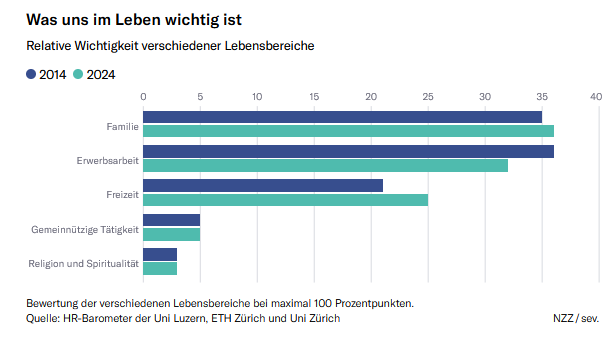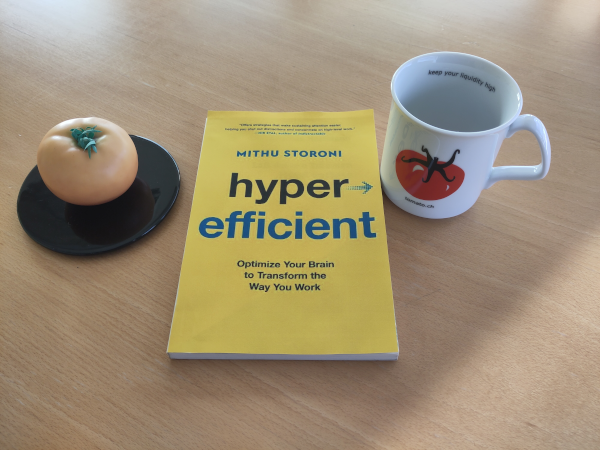TOMATO CATCH-UP - Newsletter Issue 271 - October 2024
Your monthly resource on working capital, process optimization, and issues related to the world of corporate treasurers, IT professionals, and bankers!
This newsletter is bilingual, English or German, depending on the source.
Introduction
You are stuck dealing with a difficult problem. Do what Steve Jobs would have done and follow the 10-minute rule: stand up and go for a walk. Walking makes your brain work better, helping you crack problems that troubled you while sitting. Steve Job’s rule is now backed by science: Mithu Storoni, a University of Cambridge-trained neuroscientist and author of the book Hyperefficient: Optimize Your Brain to Transform the Way You Work, shares a slew of ideas to make your brain work more efficiently, including the 10-minute rule. You can read more about Storoni’s book in our newsletter.
This month’s Catch-Up includes topics such as Structured Finance 2024, Gas & Electricity Purchasing, Treasury Hedging, Swiss LSV-Direct Debit, Nobel Prize & AI, Bank Insolvencies, The Bessings of Boring Work, Digital Detox, and more.
Remember that for any challenge related to your financial issues, you can ask Martin Schneider for a discussion that will clarify it. Contact Martin via email or call +41 44 814 2001.
- Nov 27. und 28.: Structured Finance 2024 in Stuttgart und FS in Zürich
- Purchase of Gas & Electricity with Treasury Hedging&Support – a Paradigm Change
- Tax Landscape in Switzerland in Accessible Map-Based Information
- Schweizer LSV-Direct Debit endet 2028
- Nobel Price Godfather / Pate der künstlichen Intelligenz
- Bank-Insolvenzen ein Principal-Agent-Problem
- Langweilige Arbeit ist auch ein Segen
- Book Tip - Hyper Efficient: Optimize Your Brain to Transform the Way You Work
- Termine & Events
- From the Desk of Tomato
1. Nov 27. und 28.: Structured Finance 2024 in Stuttgart und FS in Zürich
Die Messe Structured Finance im November ist fest in Ihren Plänen? Ich freue mich, Sie in Stuttgart zu sprechen und wiederzusehen!
Am 27. November werde ich am Anlass teilnehmen. Zur Messeeröffnung am 28.11.bin ich in der Messehalle erreichbar.
Wie kontaktieren Sie mich? Vor der Messe per E-Mail, LinkedIn oder Telefon - so lässt sich der Tag gemeinsam planen, zwischen den interessanten Workshops.
Suchen Sie mich auf dem Messegelände? Via der SF 2024 App oder per Call über meinen Kollegen im Büro Kloten - Zürich +41 44 814 2001. So treffen wir uns.
Am 28. November 2024 findet in Zürich das jährliche FS Digital Executive Forum statt. Ich freue mich Ihnen den Event von FS-Partner-The CFO Company vorzuschlagen. Für die Geschäftsführung ein Name und Event zum Erinnern / Behalten.
2. Purchase of Gas & Electricity with Treasury Hedging&Support – a Paradigm Change
Thank you for your feedback and raising questions to our September edition of the Tomato newsletter.
To ensure the continuity of the company and price stability, interest rates and foreign currencies have to be constantly monitored and hedged where necessary to ensure that price fluctuations do not lead to losses in the production margin.
When prices fluctuate over an extended period, experienced treasury staff should calculate the impact of changing electricity and gas prices across the group in all legal entities. This also includes an analysis of how much the treasury department can contribute to stabilizing prices for customers and suppliers.
Such change of process is sure a paradigm shift for the CFO and the Supply Chain.
It requires company-wide sharing of data, opinions and support to make informed decisions.
See the graph below blue and yellow line. The future prices of gas and electricity move along, and oil prices (orange graph) moves differently.
The graph below depicts the fluctuation of prices for oil, gas and electricity from 2006 to 2024. Source: Visit Clifford Talbot chart for more insights.
For information and brain storming contact Martin Schneider or +41 44 814 2001

Treasury can actively offset price moves with these pictured actions. Source at tomato.ch

3. Tax Landscape in Switzerland in Accessible Map-Based Information
Would you like to compare taxes in various locations for companies and/or private individuals? You can use the PwC tax comparison tool to do just that.
Individuals' relevant tax rates are determined by their place of tax residency and taxable income. The tax rates of the Swiss cantons can be compared at three different income levels: CHF 100,000, CHF 250,000, and income subject to the marginal tax rate.
When it comes to corporate tax, you can compare effective rates beyond Switzerland. Corporate tax rate comparison focuses on the ordinary corporate tax rates and does not include considerations around the OECD minimum taxation rules. The latter are only relevant for multinational groups with a consolidated annual revenue of at least EUR 750 million.
The tax rates for each canton's capital are displayed on the map of Switzerland bellow. The interactive map lets you create your own comparisons.


Read more on PwC’s blog and use the date for your company or also for your private data
4. Schweizer LSV-Direct Debit endet 2028
SIX Group hat mit den Gremien des Finanzplatzes Schweiz entschieden, das bekannte LSV+/BDD-Lastschrift-Einzugs-Verfahren zum 30. September 2028 zu beenden. Das hat Auswirkungen auf die LSV-DD Marktteilnehmer in der Schweiz. Der Anteil des Schweizer LSV-DD am allgemeinen ZV ist relativ klein, wir von Tomato AG schätzen es mit circa 5% ein. Ausserhalb der Schweiz hat das LSV einen Anteil bis zu 50-80% aller wiederkehrenden Rechnungen.
Wie geht’s weiter? Für wiederkehrende Rechnungen sind die bekannten, etablierten Formate wie eBill, QR-Rechnung, Dauerauftrag oder auch der Einzel-Zahlauftrag zu verwenden.
Do you prefer in English?
In consultation with the bodies of the Swiss financial center, SIX has decided to discontinue the existing LSV+/BDD direct debit procedures as of 30 September 2028. This decision affects all market participants participating in Direct Debit in Switzerland. Formats such as eBill, QR-invoice, standing order or single payment order have been available for several years and are established by Swiss invoice recipients.
Préférez-vous le Français ?
SIX Group a décidé, avec les instances de la place financière suisse, de mettre fin au système de Direct Débit LSV au 30 septembre 2028. Cette décision a des répercussions sur les acteurs du marché LSV-DD en Suisse. La part du LSV-DD suisse dans le prélèvement automatique général est relativement faible, nous l'estimons à environ 5% chez Tomato AG. En dehors de la Suisse, le LSV représente jusqu'à 50-80% des factures. Comment cela se passe-t-il ? Pour les factures récurrentes, les formats connus et établis depuis quelques années sont l'eBill, la facture QR, l'ordre permanent ou encore l'ordre de paiement individuel.
Do you have questions and plan to change processes?
Tomato AG Finance+IT is a leading mass payment solution provider since 1992.
Details in Deutsch, English and Français on the SIX-Site
5. Nobel Price Godfather / Pate der künstlichen Intelligenz
John J. Hopfield und Geoffrey E. Hinton erhalten den Physiknobelpreis für die Forschung zu maschinellem Lernen.
Mit der Entwicklung von künstlichen neuronalen Netzen schufen sie die Grundlage für Chatbots wie Chat-GPT. Heute gilt Geoffrey Hinton als Pate der künstlichen Intelligenz.
Von 2013 bis 2023 arbeitete er für Google Brain und die Universität von Toronto, bevor er im Mai 2023 öffentlich seinen Rücktritt von Google ankündigte und dabei Bedenken über die Risiken der Technologie der künstlichen Intelligenz (KI) äusserte. Er zeigte sich besorgt über den vorsätzlichen Missbrauch durch böswillige Akteure, technologische Arbeitslosigkeit und existenzielle Risiken durch die künstliche Intelligenz Geoffrey Hintons Weg zum Nobelpreis at NZZ
Do you prefer English?
This year’s Nobel Prize in Physics was awarded to the AI pioneers John Hopfield and Geoffrey Hinton.
Hinton has been widely credited as a godfather of AI and made headlines when he quit his job at Google last year to be able to more easily speak about the dangers of the technology he had pioneered.
"We have no experience of what it's like to have things smarter than us," Hinton said over the phone to the Nobel press conference, speaking from a hotel in California…It's going to be wonderful in many respects, in areas like healthcare," Hinton said. "But we also have to worry about a number of possible bad consequences. Particularly the threat of these things getting out of control."

Niklas Elmehed © Nobel Prize Outreach
6. Bank-Insolvenzen ein Principal-Agent-Problem
Der Credit Suisse Fall ist ein Beispiel für das Versagen der Aktionärskontrolle, ein strukturelles Problem, das in der „Too-big-to-fail“-Diskussion gewöhnlich ignoriert wird. Die Eingliederung der CS in die UBS wurde im Mai 2024 abgeschlossen und der Abbau der Altlasten schreitet voran. Der Schweizer Supertanker UBS ist in Betrieb, aber die Wahrscheinlichkeit künftiger Finanzkrisen bleibt bestehen.
Staatliche Bankenrettungen sind für den Fiskus auf lange Sicht möglicherweise nicht von Vorteil, da die Risiken unverhältnismässig hoch sind. Irland beispielsweise erlebte einen 13-prozentigen Wirtschaftseinbruch und einen Anstieg der Arbeitslosigkeit. Solche Staatsbankrotte werden in der Regel durch Hilfen des IWF, der EU und der EZB verhindert, was ein Sparprogramm mit Steuererhöhungen und Ausgabenkürzungen erfordert.
Die Verluste der Banken werden zunächst durch haftendes Eigenkapital getragen, wobei die Aktionäre die Leistung der Bank überwachen. Die Steuerzahler sollten sich jedoch nicht auf diesen Schutz als „erste Verteidigungslinie“ gegen mögliche Verluste verlassen. Das CS-Debakel verdeutlicht das Versagen der Aktionärskontrolle und das Principal-Agent-Problem. Die Aktionäre haben ihre Aktien verloren und in den letzten 13 Jahren gingen 39 Milliarden Franken an die Bonusempfänger, aber nur 9 Milliarden an die Aktionäre als Gewinnausschüttung. Eventuell gehen Manager zu ihrem eigenen Vorteil unnötige allenfalls grössere Risiken ein.
Der Fall CS zeigt, dass der Einfluss der Aktionäre für eine gute Bankführung nicht ausreicht. Das Vertrauen in die UBS hängt von der aktuellen Geschäftsleitung und dem Verwaltungsrat ab, während Schutzmassnahmen nötig sind, um „too big to fail“-Risiken zu begrenzen.
Details in der NZZ (30 kostenfreie Artikel monatlich)
7. Langweilige Arbeit ist auch ein Segen
Wenn die Künstliche Intelligenz (KI) Routinearbeiten übernimmt, bleiben die anspruchsvolleren Aufgaben dem Menschen vorbehalten. Forscher sind der Meinung - dies wird nicht anhalten. Bestimmte anspruchsvolle Aufgaben können zu einem Gefühl der Sinnlosigkeit und Langeweile bei der Arbeit führen.
Das Kooperationsprojekt zwischen der Universität Luzern, der ETH Zürich und der Universität Zürich zeigt, dass sich fast 50 % der Arbeitnehmer zumindest teilweise von ihrer Arbeit entfremdet fühlen. Sie empfinden die Arbeit als Belastung und distanzieren sich von ihr.
Doch manchmal brauchen wir Langeweile, sagt Anja Feierabend, Dozentin an der Fakultät für Wirtschaftswissenschaften der Universität Luzern. Die neuen Technologien erhöhen den Stresspegel und das Arbeitstempo, was dazu führt, dass die Menschen mit anspruchsvollen Aufgaben überfordert sind. Dies erfordert Erholung, um eine Ermüdung von Gehirn und Körper zu verhindern.
Die gute Nachricht ist, dass laut dem HR-Barometer die Freizeit in der Schweiz in den letzten zehn Jahren an Bedeutung gewonnen hat. Gleichzeitig hat der Stellenwert der Arbeit leicht abgenommen. Viele Menschen konzentrieren sich nicht mehr ausschliesslich auf die Arbeit, sondern nehmen sich bewusst Zeit für die Familie und ihre Hobbys.
Anmerkung Martin Schneider: Dank dieser Forschungsarbeit, erkenne ich mich persönlich besser. Nach anspruchsvollen Tagen von Projekt- und Lösungsarbeiten, freue ich mich an einfachen Admin-Arbeiten, um Kräfte zu tanken. Wie geht es Ihnen? Der folgenden Book Tip Hyper Efficient könnte vielleicht helfen das Dilemma zu lösen.

Weitere Lektüre in der NZZ (30 kostenfreie Artikel monatlich)
8. Book Tip - Hyper Efficient: Optimize Your Brain to Transform the Way You Work
This Financial Times must-read business book focuses on ways to optimize our lives and get our brains working at peak efficiency.
It seems that today we are expected to operate with industrial-era efficiency. Yet the work that matters most – generating creative ideas, solving complex problems, and learning – can’t be manufactured like outputs on an assembly line. Instead, we need a new, way of working: rather than imposing the rhythms of work on our brains, we impose the rhythm of our brains on our work.
Dr. Mithu Storoni, a University of Cambridge-trained neuroscientist, says that our brains have several gears that allow it to operate optimally for various mental tasks, much like an engine in a car. She demonstrates how to effortlessly switch our brains into the optimal mode for the activities at hand, utilizing the most recent science to enable optimal performance.

9. Termine & Events
- Oct. 22 – 23, 2024: MoneyLive Nordic Banking, Copenhagen, Denmark
- Oct. 27 – 30, 2024: MONEY 20/20 US, Las Vegas, US
- Nov. 6, 2024: World Finance Forum, Dubai, UAE
- Nov. 6 – 7, 2024: 19th NextGen Payments & RegTech Forum, Limassol, Cyprus
- Nov. 7 – 8, 2024: Banking 4.0 and banking innovation conference, Berlin, Germany
- Nov. 7, 2024: ACTA Tech Day 2024, Wien, in Deutsch, physisch
- Nov. 11 – 12, 2024, FFT Fintech Festival, London, UK
- Nov. 13 – 14, 2024: IACT 2024 Annual Treasury Management Conference, Dublin, Ireland
- Nov. 18 – 19, 2024: Banking. Transformed, Charlotte, NC, US
- Nov. 19 – 20, 2024: BIAN Banking Summit, London, UK
- Nov. 21, 2024: le soir Le Marche Monétaire de la BNS à Genève
- Nov. 26, 2024: EBINTEC Banking Innovation Conference and Exhibition, Istanbul, Turkey
- Nov. 27 – 28, 2024: Structured Finance in Deutsch, physisch, ICS-Messe Stuttgart
- Nov. 28, 2024: Digital Executive Forum in Deutsch, Zürich
- Dec. 3 – 5, 2024: Cyberevolution 2024, Frankfurt, Germany
- Dec. 10 – 11, 2024: 15th NextGen Payments & RegTech Forum, Austin, Texas, US
10. From the Desk of Tomato
How would you spend a day without a phone? Would you read, spend time with friends or enjoy your hobbies? More than 1,000 people participated in a 24-hour "digital detox" on September 22 with the support of the Offline Club, an Amsterdam-based organization whose goal is to "swap screen time for real-time."
In February 2024, The Offline Club hosted its inaugural "digital detox hangout" in Amsterdam. The business has since expanded to Paris, Dubai and London. At these meetings, participants are encouraged to read or chat with others while their phones are put away.
Would you take part in a Digital Detox Hangout? Regardless, we recommend starting each day with small changes, such as limiting screen time or turning off notifications to create more space to work. In this way, you will turn these small actions into daily healthy habits.
Enjoy Martin and Team from the Tomato-Atelier
